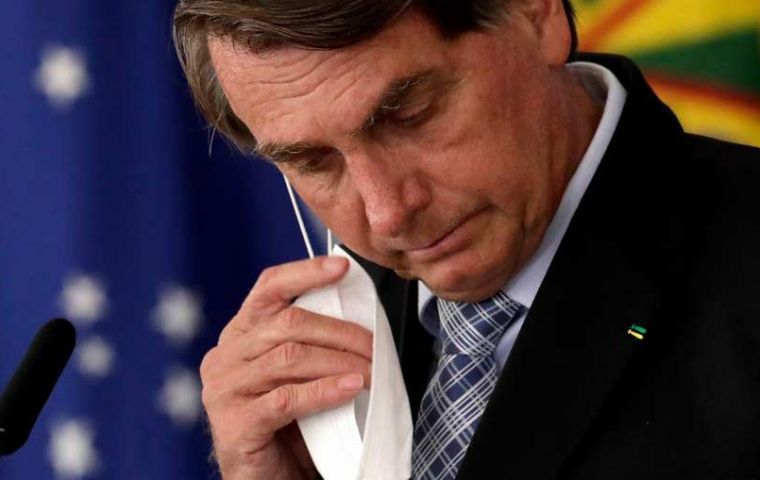MercoPress. South Atlantic News Agency
Bolsonaro guilty of crimes against humanity for COVID-19 measures
 The PPT ruling is purely symbolic but the plaintiffs were advised to bring the case before the ICC
The PPT ruling is purely symbolic but the plaintiffs were advised to bring the case before the ICC The Rome-based Permanent Peoples' Tribunal (PPT) found Brazilian President Jair Bolsonaro guilty of crimes against humanity and Human Rights violations for his handling of the COVID-19 pandemic.
“The crime for which President Bolsonaro was responsible consists of a systematic violation of Human Rights, for having caused the death of tens of thousands of Brazilians by the senseless policy he promoted during the COVID-19 pandemic,” states the PPT ruling announced this week.
Some 684,000 people have died of COVID-19 in Brazil and 34.5 million cases have been registered.
Bolsonaro questioned the magnitude of the pandemic, which he described as a “little flu” and criticized the confinement measures while promoting remedies of unproven efficacy. He also downplayed the importance of vaccines and delayed their purchase despite scientific advice otherwise. “I cannot assure that by using it a woman will not grow more hair, a man's voice will become sharper, or you can turn into an alligator,” Bolsonaro joked.
The ruling is purely symbolic and does not carry any sanctions. It was made public Thursday at the University of Sao Paulo by the judges of this international tribunal created in Rome in 1979.
Bolsonaro was tried after the case against him was filed by several Human Rights organizations, such as the Articulation of Indigenous Peoples of Brazil. The PPT did not grant the plaintiffs' request that Bolsonaro's actions constituted genocide, although it did recommend a formal complaint be filed before the International Criminal Court (ICC) in The Hague.
”The Permanent Peoples’ Tribunal (PPT) is an international opinion tribunal competent to rule on any serious crime committed to the detriment of peoples and minorities. It was born in Bologna in 1979 in the context of the Universal Declaration of Peoples’ Rights (1976) and following the intuition of jurist and politician Lelio Basso, who transformed the experiences of the Russell Tribunals on Vietnam (1966-67) and on the dictatorships in Latin America (1973-76) in a permanent institution listening to peoples forced to deal with the absence of law and impunity,” according to the PPT's website.




Top Comments
Disclaimer & comment rulesCommenting for this story is now closed.
If you have a Facebook account, become a fan and comment on our Facebook Page!